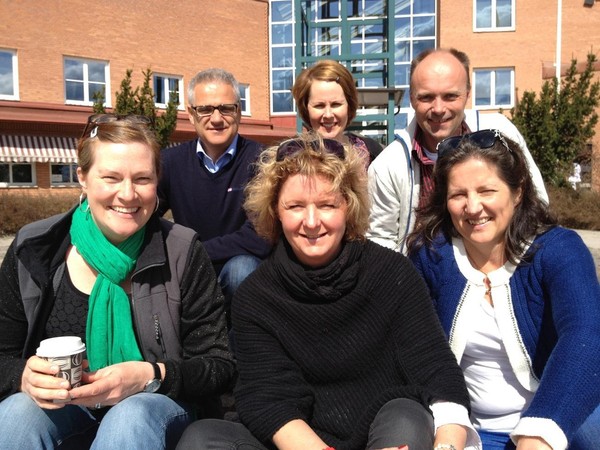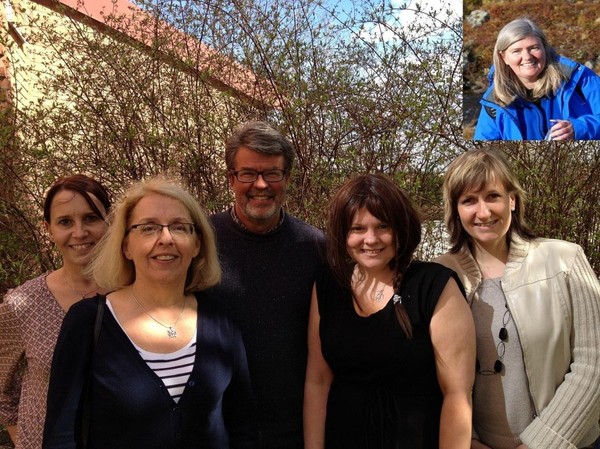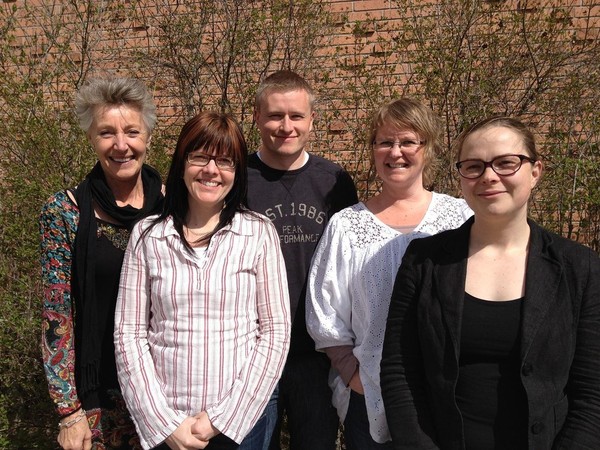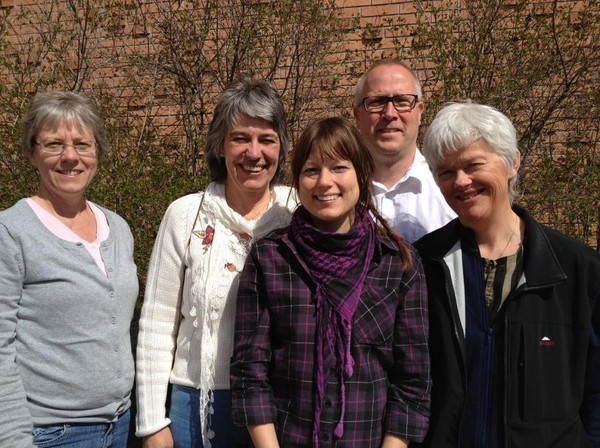Presentation of the study groups
A presentation of the main interests of each study group and a short presentation of each member (from right to left):
Study group A

We are all very excited about this field trip to China and the province of Yunnan, meeting the Chinese culture, study the school system and hopefully visit schools and meet students and staff. This is a fantastic opportunity to get close to country unknown to us and we are sure we will get an experience for life to bring back to Sweden and share with our students, colleagues and society in general.
Our areas of interest;
Gender
We would like to ask about one-child-policy and its difference between city and countryside.
Do you have special schools for boys and special for girls or are there boys and girls together in the same schools? Are boys and girls separated in different classes or do they work in the same class?
How about the activity in the classroom and in the schoolyard? Are the boys more active than the girls?
Students with disabilities and learning difficulties
One field of great interest is children with disabilities and learning difficulties. It would be interesting to see special education schools or schools that work with inclusion of pupils with disabilities.
The impact of students at school
We would like to study which impact the pupils have at school. Are there school councils and in which tasks is there possibility to influence? Is it possible for the pupils to influence how the lessons are, how they will show their work or how they will be examined? We also want to know if there are a communication between the headmaster and the pupils and how it works and if the pupils participate in the planning of the school year. Is it possible for the pupils to bring up their opinion about the school environment?
A successful school
We want to see and experience how school is structured and works. In Sweden, we hear that the results in the Chinese school are good and we would therefore like to take the road to success. We are curious about what the curriculum looks like, how teachers' professional development is and will be selected and what is successful teaching look like? Of course we are also interested to know how teaching about sustainable development is and what the students think about the environment and environmental work.
Fine Art and craft studies at school
Do students study these subjects? At all levels? What do they learn and how are they taught? How important are these subjects? Do they support the study of other subjects? Learning how to write Chinese characters, is that part of the art and craft training?
Environmental questions
When we visit China I would like to know more about Chinese children's knowledge of environmental questions, sustainable development and biological diversity. I'm also interested in Chinese children's visions about the future and their thoughts of our common responsibility for the
world.
Visits for the purpose of study
We would very much like to visit schools from junior level to secondary school,
if possible take part in lessons for example Fine Art and craft or writing Chinese characters,
visit schools for students with disabilities and meet and talk with our Yunnan colleagues.
We in Study group A are: (Above, from left to right at photo)
I´m Peter Hammers, 48 years old, and I’m living and working in Linköping, Sweden200 km south-west of Stockholm (capital). I teach social science, geography and environment knowledge with a profile of planning of society. I´m married to Ewa and we have two children Johan, 18, and Karin, 16. I´m interested in sports i.e. football.
My name is Ylva and I live in Umea in the north of Sweden. I´m a teacher for children between 12 to 15 years. My subjects are history, geography, religion and social science. My own children are 5 and 8 years
old. In my spare time I like to spend time with them and my husband, preferably outdoors in our lovely nature. I´m also interested in music, film, sports and reading.
My name is Magnus Stroemberg, 47 years old, living in a small town called Mora. It is situated in Dalarna, about 350 kilometres northwest from Stockholm. Mora is well known from the Vasa Ski Race. I have a wife, Jenny, and three lovely children, Joel 19, Petter 16 and Kajsa 14 years old. My interests are bird watching, running, badminton, reading and playing the guitar. I would be nice to visit a good bird watching spot in Yunnan! I am a teacher at the senior level and I educate in Swedish, history, geography, religion and social science.
(Below, from left to right at photo)
My name is Tina Svensson Hammargård and I´m 42 years old. I´m living in Sveg, a small, small town in the province of Härjedalen in the middle of Sweden, 450 km from the capital Stockholm. I work as a headmaster of a local F-6 school with 270 pupils.
In my family are my husband Hans and our two children Anton (14) and Agnes (10). We devote ourselves to a large extent to our children's hobbies like hockey, football and skiing. I also like to travel, read books and eat good food.
My name is Inga-Lena Spansk and I am 51 years old. I live in a small town called Mora in a part of Sweden called Dalarna. I live with my husband Johan and our dog Figo. We have four children and the oldest one Lars (23) is studying to be an engineer and Lisa (21) studying natural science and technology in Uppsala and then we have twins, Carl and Edward (17) studying at a football gymnasium in Oerebro.
I´m interested in training (gymnastics, yoga, skiing and running) and I also like to read. I work as a vice school director in the community of Mora and I´m also chief of the student health. Health in school includes special education, school nurses, school doctor, counsellors and psychologists.
Hi, my name is Anja Cameron. I’m 43 years old. I live in the countryside outside Katrineholm, a small town 140 kilometres southwest of Stockholm, with my husband Tony and our two sons Leonard, 11, and Melker, 8. I teach Fine Art and Design at a secondary school in Katrineholm.
I’m an artist specialized in sculpture, drawing and textiles.
I like physical training, good food, reading, to travel and meet people and much more!
Field study group B –

Therese Hadland, [email protected]
I am working as a program assistant for “The Global School “ at the International programme office. I am participating in the global journey to see and learn more about the global journey and to develop my skills within my work area. I am looking forward to learn more about the practical side of “the global journey” and how it feels to participate in one.
Britt-Marie Andersson, [email protected]
I am working as head of school at Katedralskolan in Linkoeping since 2005. The school is almost 400 years old, it is an upper secondary school. We have 1100 students. After graduation the students continue their studies at university. I have three grown-up daughters and live in Noerrkoeping, a city situated 45 kilometers from Linköping.
Leif Thylin, [email protected]
Part of my work is to make students more interested in science and technology. This involves education for sustainable development (ESD). The other part of my work concerns arranging trainee for students studying to become teachers.
Kristin Stenberg, [email protected] I am working as a teacher at Haerjedalens gymnasium in Haerjedalen. The school is very small and we only have about 250 students. The subjects that I teach are Swedish and history but I am also studying philosophy. I have a boyfriend but no children.
Anna Hed, [email protected] I come from Mora, a small town in Sweden with about 20 000 Inhabitants. I am a politician and my political office is all about pre-school and primary school, where everything is about how the school will be organized. The school is governed by laws and regulations but there are areas where policy plays an important role, not least in terms of school improvement. I am also a teacher in a high school in Mora.
Birgitta Larsson, [email protected] (inserted) I live in a town called Katrineholm which has about 32000 inhabitants. I work in the municipal office as the head of our 4 upper secondary schools and our school of culture. I am also responsible for the school organization for children with special educational needs. Already in the 1990s Katrineholm formulated an environmental strategy including goals for long-term sustainability. Together with the principals of our schools I try to find strategies to implement these goals in our organization.
Our group´s main interests are:
School
We would like to learn about the Chinese educational system in general and would appreciate the possibility to get access to documentation, such as guidelines and syllabi. One of our aims is to make a comparative study between schools in the countryside and schools in city areas.
We have a special interest in education for sustainable development (ESD) and how the subject is presented for children of different age. Furthermore we would like to do study visits in order to observe tuition and everyday life at school. It would be interesting to follow the work of some principals and teachers in order to learn about their daily work and discuss similarities and differences compared to Sweden. Other areas of interest are examinations and grades. What possibilities are there for students who do not succeed in school?
If possible, we also look forward to learn about the teacher Education in China.
Food
A basic need for people all over the world is food and factors concerning production, distribution and cooking. Again we like to make a comparative study between the countryside and the city. We would like to look into how basic food is produced and distributed to the consumers.
Is subsistent house holding common in the countryside? Is there a difference compared to the city when it comes to food supply and distribution? We are also interested in comparing the everyday meals at home and in schools. Furthermore, we would like to add the aspect of sustainable development in the study of production and distribution of food.
Study visits
Schools for children of different age
Chinese medicine
Physical activities
Rice plantation
Study group C

My name is Magdalena Saevenstesdt 60 years old and I have three daughters and four grandchildren. I live with my husband Pekka in the city of Umea and in our summerhouse when I am free from work. I work as a school leader at HagaSchool, the children are between 1 and 16 years old. I am also responsible for the school area of Haga, with 5 schools and 25 parts of daycare center.
My name is Monica Bigren and I´m 40 years old. Me and my husband Marcus have two children, Amanda is eight and John is eleven years old. I´m a teacher and I teach children in the age of 10 to 13 years in Science, Maths and English.
My name is Jonas Sundstroem and I am 34 years old. My wife and I have two children, a boy named Victor and a girl named Freja. I work as a teacher in a school for students with intellectual disabilities. The students are between 16-20 years old. The subjects I teach are mathematics, religion and social studies.
My name is Aasa Wahlgren and I´m 45 years old. I am married to Ulf and we have two children, Ida 22 years and Max 21 years old. I´m principal for a school with 300 students in age from six to thirteen years old.
My name is Karin Kers. I’m a 31 years old female senior high school teacher. I teach social sciences at Haerjedalens Gymnasium in Sven, Haerjedalen, where I live during the week. I spend my weekends with my husband Roland in our house in Vikarbyn, Dalarna (17 kilometres from Sveg).
Our main interests are:
What are the plans for creating a long-term sustainable development locally – nationally – globally (how to solve issues like: supply of energy (how to replace fossil fuels/create a society that uses less energy); producing enough food in a sustainable way (avoiding soil erosion, desalination), over consumption/ over use of resources/unsustainable economy (today we exceed the earth’s long-term ecological sustainability by about 50 per cent); inequality nationally and globally (people are protesting to social injustices globally, how can we create a more equal world: social sustainability).
Education for Sustainable Development and Sustainable Development in Yunnan – China – Globally
How is ESD implemented in the school system/classroom? Are students and people in general aware of these issues (what do students learn about and how do they practice SD in school)? Are students trained in and actively taking part in democratic decision making in the classroom? Is education equally available to all children (independent on whether they live in the city or in the countryside, or their parent’s degree of education/financial situation etc).
What is being done to make Yunnan more sustainable long-term (ecologically, socially, economically – the city as well as the country side)? Do authorities, for example, promote organic, local and small scale farming (and/or self-sufficiency)? What areas/issues/projects – for creating a sustainable development – are in focus in Yunnan (what questions/problems are most important/acute)?1 What are the advantages of the Yunnan province in creating a SD?
Gender/Gender equality - Gender refers to the socially constructed roles, behaviour, activities and attributes that a particular society considers appropriate for men and women.
The distinct roles and behaviour may give rise to gender inequalities, i.e. differences between men and women that systematically favour one group. In turn, such inequalities can lead to inequities between men and women in both health status and access to health care.
We are interested in how you work with Gender equality at school? Do boys and girls go together in the classes? What does it look like in your society?
We are also interested to learn how you work with inclusion. For example are students with intellectual and/or physical disabilities integrated in the school system? If so, what are your methods for working with these students?
We are interested in knowing how ordinary life can be for a student in China. How big differences are there between the life in the city compared to the country life?
How does a day in a student´s life look like in China compared to a student´s life in Sweden?
Study visits
School - We would like to learn about the Chinese educational system in general and specifically how it works in the countryside and in the city where we are going to stay.
Agriculture/farming
Culture/handicraft
Field study group D

Catharina Lundqvist. I work as principal for 17-20 years old disabled students. Some of them can read and write but some of them have difficulties to learn and speak. Because of that problem we teach them sign language and we draw pictures so they can point and speak through the pictures.
Eva Böhlmark. I have been working as a teacher for nearly 30 years. I teach pupils between age 10-12, nowadays mostly in mathematics. I like to be out in the nature, skiing wintertime and biking or walking during summer. My husband and I have got three sons, just one lives at home for the moment.
Helena Larsson. I am working as a teacher in Spanish and Swedish as a second language. My students are between 13 and 18 years old at the moment. I am also a politician and I am interested in questions regarding sparsely populated areas and sustainability in general. My family consists of my mum, my grandmother and my sister and my main interests are spending time in the nature and travelling.
Lars Uhlin. I am working as a teacher in math and physics combined with being a principal for the Natural Science program. Our students are 16-19 years old. Our school has 1100 students and all the programs given at the school are to prepare the students for further studies at the university. I have been teaching for 20 years and I am very keen on to see how you are working with ESD and share how we do it in my school. Another aim of my visit is to establish contacts so my students can communicate with yours and maybe work together with ESD.
Agneta Fries. I am working with children age 6-15 years at the nature school. The nature school is a method of learning with the basic idea to learn outdoors. We go to different
schools in the community and use outdoor education to teach most subjects, like mathematics, English, ecology etc. We also run courses for teachers. Our overall aim is sustainable development.
As a group our main interests are:
We are interested in questions regarding society in general and particularly questions regarding sparsely populated areas. We would like to know more about how you organize school attendance in sparsely populates areas (Transportation/ Homeschooling/ Boarding schools and so on), and also how functions in society are managed in these areas (like Recycling/ Reuse/ Energy use/ Energy supplies/ Urbanization etc.).
When it comes to questions regarding school we are interested in teaching methods and education in general and more specifically we would like to know if, and in that case how, you work interdisciplinary. We would also like to know if and how you work with student participation and inclusion (students from different areas and different religions/ boys and girls/ disabled student / students with special needs). Finally we would like to learn more about how you work with ESD.
We would like to have the opportunity to visit a nature reserve.
We are all looking forward to meeting you in September.
If you have any questions to us please don’t hesitate to ask.
